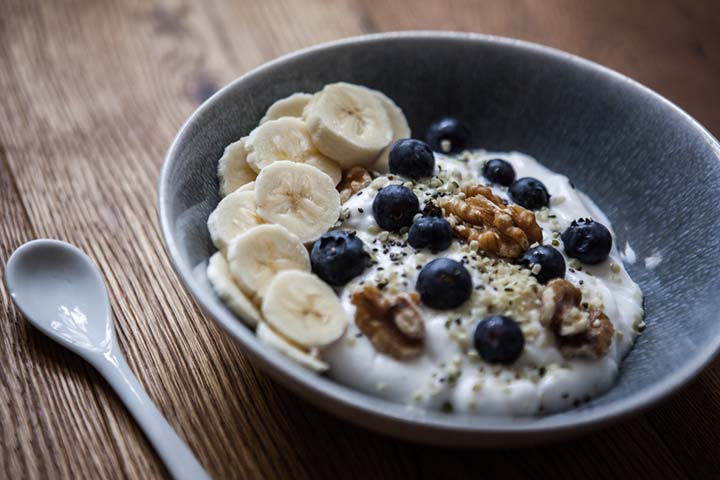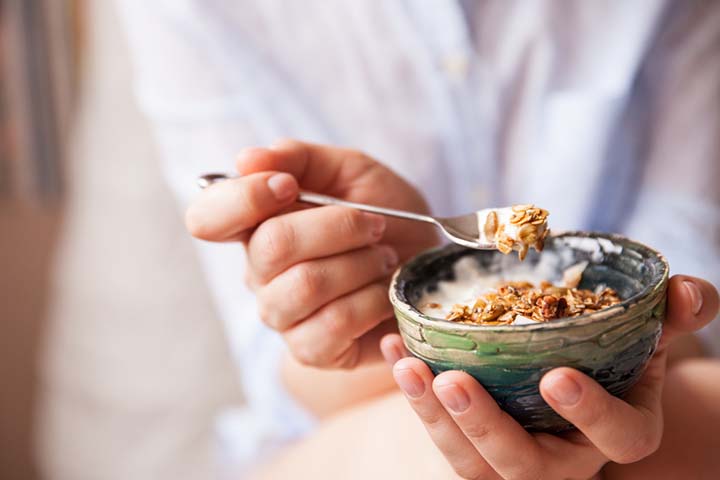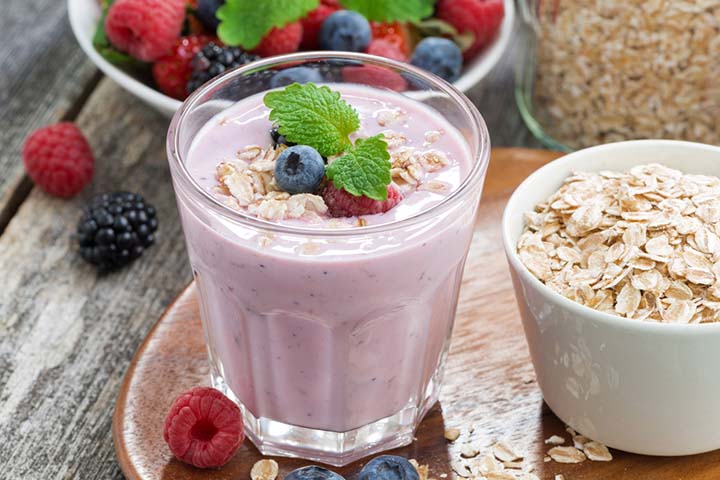Oats is a healthy cereal known for its high nutritional profile (1). Owing to the abundant health benefits of oatmeal for breastfeeding moms, many are keen to include it in their breastfeeding diets. This is also because oats are believed to have lactogenic properties that may increase breast milk production in nursing moms. Oats is also a widely used breakfast dish and a supplement for other dishes.
This post tells you the details about the galactagogueiXSubstance that increases milk production properties of oats and the potential benefits of consuming oats while breastfeeding.
Does Oatmeal Increase Breast Milk Supply?
Traditionally, oatmeal is used as a galactagogue in many cultures. Lactation experts believe that oats may increase the production of the oxytocin hormone, which can help increase breast milk production (2). However, there is no conclusive scientific evidence to prove that oats can increase breast milk supply.
The belief of oats being a galactagogue is probably propagated due to its use as a lactogenic food for centuries as a lactation supplement (3). Nevertheless, you can safely make oats part of your motherhood diet. The US Department of Health and Human Services recommends oatmeal among other whole grains, as a part of a balanced diet for breastfeeding mothers (4).
An anonymous breastfeeding mother shared her experience of using oatmeal to increase her milk supply. She explains, “Whenever I feel that my supply is low or when I feel that Little A is going for unlimited latching sessions, taking galactagogue seems to help. Sometimes, I pop two Natalac capsules which are dried moriangga leaves. Other times, I eat oatmeal. But, the most fun of all galactagogues is the lactation cookies I make! … These are oatmeal with chocolate chips! I’ll make more flavors in the future! I eat about 4 to 6 of these a day with a cup of hot cocoa (i)”
Health Benefits Of Oats For Breastfeeding Mothers
Whole oats contain proteins, carbohydrates, and dietary fiber (soluble and insoluble). The following are some of the notable health benefits of oats.
- Provides vital nourishment and micronutrients: Oats contain several essential micronutrients, including vitamin B6, vitamin E, zinc, iron, folic acid, copper, and magnesium (5). These nutrients can help in postpartum recovery while also supporting the baby’s health through breast milk by providing important nutrition (6). Breastfeeding support, combined with a nutritious diet, can help mothers achieve their nutritional requirements.
- Improves digestive health: Fiber in oats could improve bowel movement, thus avoiding/ easing constipation. Besides, it could promote gut microbiotaiXThe microorganisms present in a person’s digestive system, which may improve digestive issues, such as irritable bowel syndrome (1). Studies also suggest that maternal consumption of fiber-rich foods, such as oats, may modify breast milk composition and promote infant health (7).
- May promote immunity: Oats contain beta-glucaniXA type of soluble fiber derived from oats and barley and bioactive antioxidantsiXMan-made or natural substances that may prevent or slow down cell damage caused due to harmful molecules called free radicals and have antimicrobial effects” ] that have anti-inflammatory and antioxidant effects (8). These compounds may boost the maternal immune system, which in turn can benefit the baby, as well.
- Benefits overall health: Several studies have shown that regular consumption of whole oats could regulate blood glucose, blood cholesterol, and blood pressure (9) (10).
The health benefits of oats majorly depend on the type of oats consumed. Prefer whole oats to processed, ready-to-cook instant oats to enjoy maximum benefits.
Are There Any Side Effects Of Consuming Oats When Nursing?
Oats do not have any side effects for breastfeeding mothers. In some individuals, they may have specific side effects (11).
- Individuals sensitive to fiber may experience bloating and flatulence when consuming oats for the first time. Start with a small serving and gradually increase the quantity.
- Those with chewing and swallowing issues should avoid eating oats. Poorly-chewed oats may increase the risk of intestinal blockage.
- If you have any problems or disorders of the gastrointestinal tract, consult a doctor before adding oats to your diet. Digestive tract problems that delay gastric emptying may increase the risk of intestinal blockage due to oats.
- Oats is a gluten-free cereal grain, but it may cross-contaminate with gluten-containing cereal grains, such as wheat. Mothers with gluten intolerance/sensitivity may go with organic, non-GMO products/brands.
Oats do not have any known interactions with medicines. Nevertheless, if you are on medication or consume dietary supplements, take the advice of a lactation consultant or a doctor before consuming oats.
How Can Nursing Mothers Add Oats To Their Diet?
Whole oat groats, steel-cut oats, rolled oats, and instant oats are types of oats that can be a part of your healthy diet. Whole oat groats and steel-cut oats are the least processed type but may take longer to cook and digest. Rolled oats and instant oats cook faster but may contain fewer nutrients.
The following are the different ways to enjoy oats as part of your lactation diet.
- Oatmeal prepared with rolled or steel-cut oats mixed with skimmed milk, a handful of nuts, and topped with fresh seasonal fruit slices makes for a healthy choice for nursing mothers.
- Savory oats porridge made with rolled or instant oats, seasonal vegetables, and a teaspoon of seeds, like sesame seeds, can be a healthy alternative to sweet oatmeal.
- Oats pancake is a healthy breakfast recipe to include oats flour in your diet.
- Sandwiches and rolls made with oatmeal bread, vegetables, and homemade spreads, make for a nutritious snack.
- Overnight oats is an easy no-cook breakfast and snack recipe. Add oatmeal to milk/yogurt and add seeds, like chia seeds, and leave it overnight in the refrigerator to prepare it.
- Oats cookies and bars made with healthy ingredients, like cinnamon, nuts, seeds, and dried fruits are a delicious snacking option. Some lactation cookies have oats as a primary ingredient, which can supply these important micronutrients.
- Oatmeal soup made with whole oats groats or rolled oats, vegetables, and chicken/tofu shreds is an appetizing dinner recipe.
You can also add rolled oats or oats bran to other soup recipes to increase your fiber intake.
Although there is not enough scientific evidence to prove that oatmeal helps increase the breast milk supply, it can be a valuable addition to the diet of lactating mothers. However, if you are suffering from any digestive disorder or are sensitive to the presence of fiber in your diet, the chances are high that you might experience signs of bloating or other digestive issues. Therefore, it is advised to consult your doctor and know your food preferences before including oatmeal in your diet to avoid any complications.
Key Pointers
- Oatmeal is believed to increase breastmilk production and offers various health benefits.
- Rare side effects may include bloating, intestinal blockage, or GIT issues.
- You may include oatmeal in your nursing diet after consulting with your doctor.














